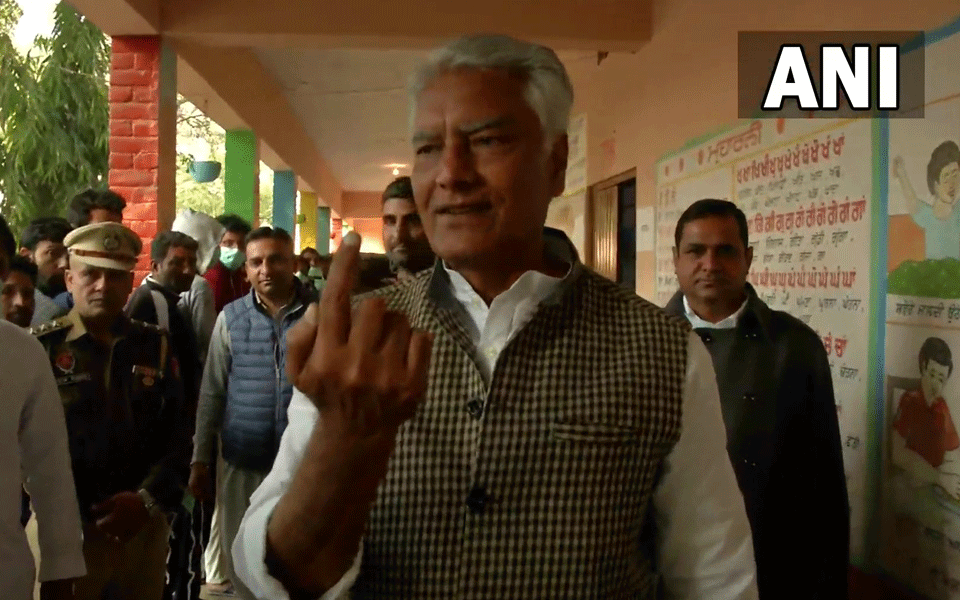Chandigarh(PTI): Voting for 117 Assembly seats in Punjab began on Sunday morning amid tight security arrangements. Polling started at 8 am and will continue till 6 pm.
A total of 1,304 candidates, including 93 women and two transgenders, are in the fray for the high-stake electoral contest. There are 2,14,99,804 voters, including 1,02,00,996 women.
There are 24,740 polling stations, of which 2,013 have been identified as critical while 2,952 are vulnerable, said Punjab Chief Electoral Officer S Karuna Raju.
Punjab is witnessing a multi-cornered contest among the Congress, AAP, SAD-BSP, BJP-PLC-SAD (Sanyukt) and the Sanyukt Samaj Morcha, a political front of various farmer bodies.
The Shiromani Akali Dal is contesting the polls in alliance with the Bahujan Samaj Party (BSP).
The BJP is fighting the elections in alliance with Amarinder Singh-led Punjab Lok Congress and Sukhdev Singh Dhindsa-led SAD (Sanyukt).
The SSM is contesting the polls with Haryana Bharatiya Kisan Union (Chaduni) leader Gurnam Singh Chaduni-led Sanyukt Sangharsh Party.
Prominent faces in the fray include Chief Minister Charanjit Singh Channi, Aam Aadmi Party's chief ministerial face Bhagwant Mann, Punjab Congress president Navjot Singh Sidhu, former CMs Amarinder Singh and Parkash Singh Badal, and Shiromani Akali Dal chief Sukhbir Singh Badal.
Former chief minister Rajinder Kaur Bhattal, Punjab BJP chief Ashwani Sharma and former Union minister Vijay Sampla are also in the fray.
A total of 700 companies of the central armed police force besides the state police personnel have been deployed.
There are 196 pink polling stations for women while 70 polling stations will be managed by persons with disabilities (PwD).
In the wake of COVID-19, arrangements have been made for masks, gloves and sanitisers at polling stations and also for the disposal of Covid waste material.
Let the Truth be known. If you read VB and like VB, please be a VB Supporter and Help us deliver the Truth to one and all.
Tel Aviv, May 13 (AP): Israeli Prime Minister Benjamin Netanyahu says there is “no way” Israel will halt its war in Gaza, even if a deal is reached to release more hostages.
His comments are likely to complicate talks on a new ceasefire that had seemed to gain momentum after Hamas released the last living American hostage on Monday in a gesture to US President Donald Trump, who is visiting the region but skipping Israel.
They pointed to a potentially widening rift between Netanyahu and Trump, who had expressed hope that Monday's release of Israeli-American soldier Edan Alexander would be a step toward ending the 19-month war.
In comments released by his office Tuesday from a visit to wounded soldiers the previous day, Netanyahu said Israeli forces were just days away from a promised escalation of force and would enter Gaza “with great strength to complete the mission. ... It means destroying Hamas.”
Any ceasefire deal reached would be temporary, the prime minister said. If Hamas were to say they would release more hostages, “we'll take them, and then we'll go in. But there will be no way we will stop the war,” Netanyahu said. “We can make a ceasefire for a certain period of time, but we're going to the end.”
Hamas has said it will only release the remaining hostages in return for more Palestinian prisoners, a lasting ceasefire and an Israeli withdrawal from Gaza. The dispute over whether to end the conflict has been the main obstacle in negotiations going back more than a year.
Israel says 58 hostages remain in captivity, with as many as 23 of them said to be alive, although authorities have expressed concern about the condition of three of them.
Many of the 250 hostages taken by Hamas-led militants in the Oct. 7, 2023 attack that started the war were freed in ceasefire deals.





